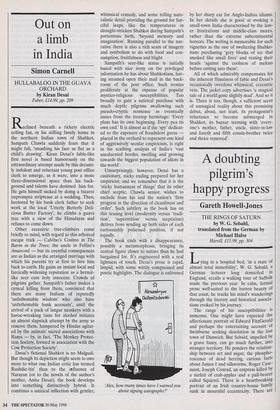Out on a limb in India
Simon Camel!
HULLABALOO IN THE GUAVA ORCHARD by Kiran Desai Faber, £14.99, pp. 209 Reclined beneath a rickety electric ceiling fan, in his stifling family home in the northern Indian town of Shahkot, Sampath Chawla suddenly fears that it might fall, 'smashing his face as flat as a child's drawing'. Khan Desai's fable-like first novel is based humorously on the extraordinary attempt made by this dreami- ly indolent and reluctant young post office clerk to emerge, as it were, into a more three-dimensional space than his back- ground and talents have destined him for. He gets himself sacked by doing a bizarre impromptu striptease at a wedding. Then, hectored by his bank clerk father to seek work at the local 'Utterly Butterly Deli- cious Butter Factory', he climbs a guava tree with a view of the Himalayas and refuses to come down.
Other eccentric tree-climbers come briefly to mind, with regard to this arboreal escape trick — Calvin's Cosimo in The Baron in the Trees; the uncle in Fellini's. Amarcord — but its eventful consequences are as Indian as the arranged marriage with which his parents try at first to lure him back to earth. He gains an instant local and farcically widening reputation as a hermit- like seer cum holy innocent. Crowds of pilgrims gather. Sampath's father makes a cynical killing from them, convinced that there are many Indians of reputedly `unfathomable wisdom' who also have `unfathomable bank accounts', until the arrival of a pack of langur monkeys with a havoc-wreaking taste for alcohol initiates an almost slapstick attempt by the army to remove them, hampered by Hindus agitat- ed by the animals' sacred associations with Rama — by, in fact, 'The Monkey Protec- tion Society, formed in association with the Cow Protection Society'.
Desai's fictional Shahkot is no Malgudi. But though its depiction might seem to owe more to what one Indian critic has termed Rushdie-itis' than to the influence of Narayan (or to the novels of the author's mother, Anita Desai), the book develops into something distinctively hybrid. It combines a satirical inflection with gentler, whimsical comedy, and some telling natu- ralistic detail providing the ground for fan- ciful leaps, like the temperatures in drought-stricken Shahkot during Sampath's portentous birth, 'beyond memory and imagination'. Running parallel to the nar- rative there is also a rich seam of imagery and symbolism to do with food and con- sumption, fruitfulness and blight.
Sampath's seer-like status is initially based with nice irony on the privileged information he has about Shahkotians, hav- ing steamed open their mail in the back- room of the post office. Such ironies proliferate at the expense of popular mystico-religious susceptibilities. Too broadly to gain a satirical purchase with much depth; pilgrims swallowing such pseudo-cryptic nonsense as eventually issues from the treetop hermitage: 'Every plum has its own beginning. Every pea its own end.' It is almost as if the 'spy' dedicat- ed to the exposure of fraudulent gurus placed in the orchard to represent one kind of aggressively secular empiricism, is right in his scathing analysis of India's 'vast uneducated hordes, swelling and growing towards the biggest population of idiots in the world'.
Unsurprisingly, however, Desai has a cautionary, sticky ending prepared for her empiricist; and we remember that it is the `sticky humanness of things' that its other chief sceptic, Chawla senior, wishes to exclude from his and the nation's 'firm progress in the direction of cleanliness and order'. Such subtlety as the book has on this teasing level (modernity versus 'tradi- tion', 'superstition' versus scepticism) derives from sending up both sides of each cartoonishly polarised position, if not equally.
The book ends with a disappearance, possibly a metamorphosis, bringing its central figure closer to nature than he had bargained for. It's engineered with a real lightness of touch. Desai's prose is rapid, limpid, with some wittily compressed and poetic highlights. The dialogue is enlivened Alex, how many times have I warned you about signing autographs?' by her sharp ear for Anglo-Indian idioms. In her details she is good at evoking a small-town India characterised by the less- er frustrations and middle-class mores, rather than the extreme subcontinental horrors. The writing is memorable for such vignettes as the one of sweltering Shahko- tians purchasing 'grey blocks of ice that smoked like small fires' and resting their heads 'against the coolness of melons before cutting into them'.
All of which admirably compensates for the inherent flimsiness of fable and Desai's occasionally overdone whimsical, eccentric vein. The jacket copy advertises 'a magical tale of a world gone slightly mad'. And so it is. There is too, though, a sufficient scent of unmagical reality about this promising debut, about, not least, its protagonist's reluctance to become submerged in Shahkot, its bazaar teeming with 'every- one's mother, father, uncle, sister-in-law and fourth and fifth cousin-brother twice and thrice removed'.


































































 Previous page
Previous page